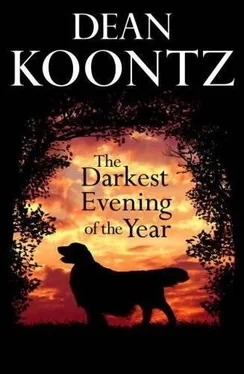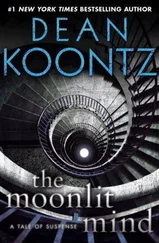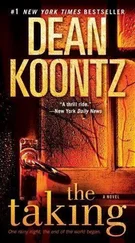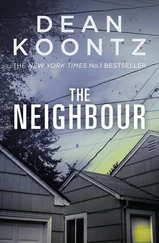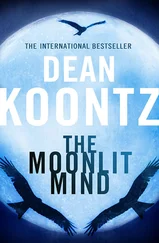As any golden would do in a new environment, Nickie had gone exploring, chasing down the most interesting of all the new smells, weaving among chairs and sofas, mapping the landscape, identifying the coziest corners.
Filled with pride of home, Fred and Ethel followed the newcomer, pausing to note everything that she had noted, as if sharing with her had made the bungalow new again to them.
Sniffing, grinning, chuffing with approval, tails lashing, the new girl and her welcoming committee rushed past Amy.
By the time that she turned to follow them, they had vanished across the hall, into her bedroom. A moment ago, only a nightstand lamp had illuminated that room, but now the ceiling fixture burned bright.
“Kids?”
Matching plump sheepskin-covered dog beds mushroomed in two corners of the bedroom.
As Amy crossed the threshold, Nickie bumped a tennis ball with her nose, and Fred snatched it on the roll. Nickie checked out but didn’t want a plush blue bunny, so Ethel snared it.
The bedroom and the attached bath lacked an intruder, and by the time Amy followed the pack to the study, the fourth and last room in the bungalow, the ceiling light was on there, too.
Fred had dropped the ball, and Ethel had cast aside the bunny, and Nickie had decided not to stake a claim to a discarded pair of Amy’s socks that she had fished out of the knee space under the desk.
Paws thumping, nails clicking, tails knocking merrily against every crowding object, the dogs returned to the hall, then to the kitchen.
Puzzled, Amy went to the only window in the study and found it locked. Before leaving the room, she frowned at the wall switch and flipped it down, up, down, turning the ceiling fixture off, on, off.
She stood in the hall, listening to thirsty dogs lapping from the water bowls in the kitchen.
In the bedroom again, she checked both windows. The latches were engaged, as was the one in the bathroom.
She peered in the closet. No boogeyman.
The front-door deadbolt was locked. The security chain remained in place.
All three living-room windows were secure. With the dampers closed, no sinister Santa out of season could have come down the fireplace chimney to play games with the lights.
Behind her, she left on only the single nightstand lamp and the reading lamp in the living room. At the end of the hall, she stopped and looked back, but no gremlins had been at work.
In the kitchen, she found the three goldens lying on the floor, gathered around the refrigerator, heads raised and alert. They looked from her to the refrigerator, to her again.
Amy said, “What? You think it’s snack time-or am I going to find a severed head in the lettuce drawer?”
Fire spawns fitful drafts in the still night, brief twists of hot wind that stir Harrow ’s hair but dissipate behind him.
The people asleep in the house, if in fact anyone is at home, are strangers to Harrow. They have done nothing to him. They have done nothing for him, either.
They mean nothing to him.
He doesn’t know what they mean to Moongirl. They are strangers to her, as well, but they have some meaning for her. They are more to her than a mere medicine for boredom. He wonders what that might be.
Although curious, he will not ask her. He believes that he is safer if she thinks his understanding of her is complete, if she believes they are alike.
Flames engulf the back porch, and the sounds of consumption begin to arise from the front.
Moongirl’s hands are in the pockets of her black leather jacket. Her face remains expressionless. In her eyes is nothing more than a reflection of the fire.
Like her, Harrow has discipline of his intellect and of his body, but unlike her, he also has discipline of his emotions. Those are the three hallmarks of sanity.
Boredom is a state of mind akin to an emotion. Perhaps the emotion to which boredom most often leads is despair.
She seems too strong to be seriously discouraged by anything, yet she fights boredom with such reckless entertainments as this burning, which suggests that she dreads falling into an inescapable well of despair.
Laceworks of firelight flutter across the grass, and across Moongirl, dressing her as if she is an unholy bride.
A light appears in the middle window.
Someone has awakened.
Sheer curtains deny a clear view, but judging by the murkiness of the light and by the amorphous shadows, smoke already roils in the room.
The house is pier-supported. Evidently, the flames writhed at once into the crawl space, a thousand bright tongues flickering, hissing poisonous fumes up through the floor.
Harrow thinks he hears a muffled shout, perhaps a name, but he cannot be certain.
Instinct, imperfect in the human species, will harry the rudely awakened residents toward the front door, then toward the back. They will find a deep wall of flames at either exit.
The moon seems to recede as the night grows bright. Fire wraps the corners of the house.
“We could have driven in another direction,” says Moongirl.
“Yes.”
“We could have found a different house.”
“Infinite choices,” he agrees.
“It doesn’t matter.”
“No.”
“It’s all the same.”
From inside, screaming arises, the shrill cry of a woman; and for sure, this time, a shout, the voice of a man.
“They thought they were different,” she says.
“But now they know.”
“They thought things mattered.”
“The way they took care of the house.”
“The carved cornice.”
“The miniature windmill.”
Now the character of the screaming changes from a cry of terror to shrieks of pain.
Sullen fire throbs inside, beyond the windows. The place has been tinder waiting to be lit.
Likewise, the people.
At the middle window, the sheer curtains vanish with a quick flare, like diaphanous sheets of flash paper between a magician’s fingertips.
In front of the house, the lonely two-lane road dwindles into darkness that even the dawn might not relieve.
Glass shatters outward, and a tormented figure appears at the middle window, in silhouette against the backdrop of the burning room. A man. He is shouting again, but the shout is half a scream.
Already the woman’s voice has been stifled.
The French panes do not allow an easy exit. The man struggles to twist open the lock, to raise the bottom sash.
Fire takes him. He falls back from the window, collapsing into the furnace that was once a bedroom, suffering into silence.
Moongirl asks, “What was he shouting?”
“I don’t know.”
“Shouting at us?”
“He couldn’t see us.”
“Then at who?”
“I don’t know.”
“He has no neighbors.”
“No.”
“No one to help.”
“No one.”
Heat bursts a window. Blisters of burning paint pop, pop, pop. Joints creak as nails grow soft.
“Are you hungry?” she asks.
“I could eat something.”
“We’ve got that good ham.”
“I’ll make sandwiches.”
“With the green-peppercorn mustard.”
“Good mustard.”
Spirals of flame conjure the illusion that the house is turning as it burns, like a carousel ablaze.
“So many colors in the fire,” she says.
“I even see some green.”
“Yes. There. At the corner. Green.”
Smoke ladders up the night, but nothing climbs it except more smoke, fumes on fumes, soot ascending soot, higher and higher into the sky.
With breakfast and the morning walk only a couple of hours away, Amy would not let the gang of three pan-handle cookies from her. “No fat dogs,” she admonished. In the refrigerator she kept a plastic bag of sliced carrots for such moments.
Читать дальше
Конец ознакомительного отрывка
Купить книгу
